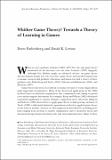Whither Game Theory? Towards a Theory of Learning in Games
Author(s)
Levine, David K.; Fudenberg, Drew
Downloadjep.30.4.151.pdf (711.1Kb)
PUBLISHER_POLICY
Publisher Policy
Article is made available in accordance with the publisher's policy and may be subject to US copyright law. Please refer to the publisher's site for terms of use.
Terms of use
Metadata
Show full item recordAbstract
Game theory has been a huge success in economics. Many important questions have been answered, and game theoretic methods are now central to much economic investigation. We suggest areas where further advances are important, and argue that models of learning are a promising route for improving and widening game theory's predictive power while preserving the successes of game theory where it already works well. We emphasize in particular the need for better understanding of the speed with which learning takes place.
Date issued
2016Department
Massachusetts Institute of Technology. Department of EconomicsJournal
Journal of Economic Perspectives
Publisher
American Economic Association
Citation
Fudenberg, Drew, and David K. Levine. “Whither Game Theory? Towards a Theory of Learning in Games.” Journal of Economic Perspectives, vol. 30, no. 4, Nov. 2016, pp. 151–70.
Version: Final published version
ISSN
0895-3309